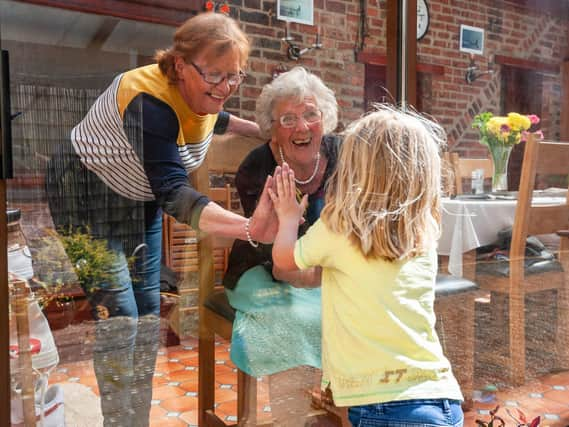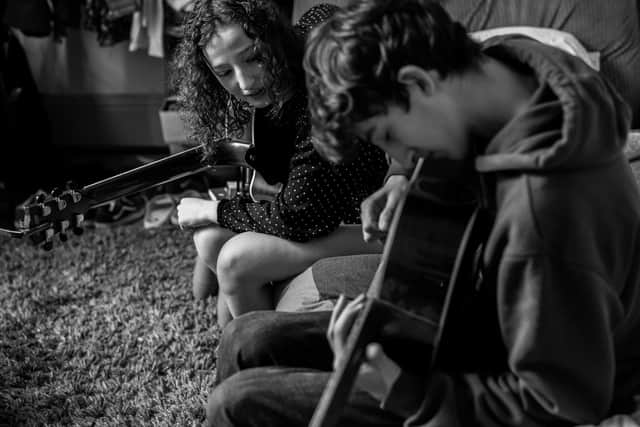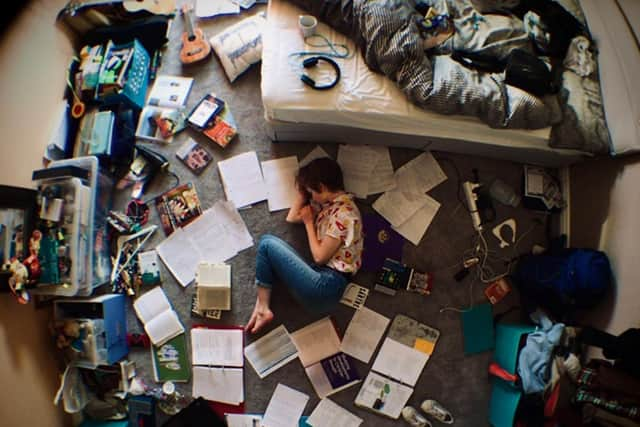Meet the people documenting their pandemic experiences for the generations of tomorrow


Right now, individuals across Yorkshire are documenting their own lives, as the two Anne’s did many years ago. From film and photography to art and the written word, people are finding different ways of reflecting on life in lockdown during a global pandemic. And, as many of them recognise, this record of now could become a part of the dialogue of COVID-19 for the generations of tomorrow.
“We have no idea at this moment how significant this time is,” reflects Shipley-based artist and photographer Carolyn Mendelsohn. “We don’t know how long it’s going to last, we don’t know what the implications are going to be for our society. And I think historically looking at pictures from this time and writings from this time will be a really important record of what went on.”
Advertisement
Hide AdAdvertisement
Hide AdCarolyn has been creating a ‘visual diary’ of her time in lockdown, publishing her photographs on social media platform Instagram. “This time is really unique and none of us have experienced anything like it before. I decided that I wanted to document it photographically, document my family’s experience and also what the world looked like from a self-distancing perspective.”


“I felt that the experience of teenagers during this time is so important,” she says. “Their worlds have been turned upside down, many not taking exams they have prepared for or being able to say goodbye to friends - and suddenly living in a very strange and frightening world. I wanted to see how they see the current time. Even the mundane is interesting."
Photographer Matthew Dever is also capturing life during the pandemic from his home in Kirkby Fleetham, North Yorkshire, which he shares with partner Emma and four-year-old son Beau.
“This is meaningful for me,” he says, “but then I suppose there are many other people in exactly the same situation so there’s a commonality there too...For me, it’s also about keeping a record for our lad Beau. This is a document for him to look back on.”


Advertisement
Hide AdAdvertisement
Hide AdOthers have turned to the written word to reflect on the evolving situation. Retired psychologist Stuart Larner, of Scarborough, for example, has been writing poetry inspired by the period. One, entitled Two Meeters, explores a paradox around social distancing - the idea that in staying away from others, we are also all connected in the same endeavour.
“[This period] tells us a lot about ourselves," Stuart reflects, "It makes us appreciate humanity more, see life’s problems in a wider context and realise what matters...It makes you connect more with people."
For Colin Speakman, poetry has been a way to help him make sense of the world during a challenging period. The first of his poems to be drawn from his day-to-day experiences during the pandemic was based on his time in lockdown in a hotel room in Tenerife last month.
“I feel that a few days behind an experience, I can begin to make shape of it,” Colin, a member of Wharfedale Poets, says. “What I wanted to try and do was to document my own feelings, really for my own sanity. I think we’re all under mental and emotional pressure and this is one way of coping.”
Advertisement
Hide AdAdvertisement
Hide AdFellow poet Clint Wastling is drawing on the experiences of others to inform his work. Clint, based in Beverley, is working on a multimedia project exploring how four generations of women are coping with the lockdown. He is focusing on his mother, who is isolating in sheltered housing, his wife, pregnant daughter and his granddaughter.
“The changes that we’ve suddenly been taken through over the last few weeks do need to be written about and thought about,” he says.
Cal Stockbridge, who has been keeping a journal since day one of the lockdown, agrees. Two teenage students from overseas are currently living with Cal near Kirkby Misperton after the boys became stranded in England when their home country closed its borders.
“It’s been interesting to have such a close comparison available between this country’s response to the virus and their own. And, of course, to see how well they are coping with this separation with no end in sight.”
Advertisement
Hide AdAdvertisement
Hide AdEach day, Cal writes about family, the UK and the global response. “When we had a year thinking about the First World War with the centenary, I really noticed how much personal records contributed to that, reading postcards from the front and the letters that people sent to each other.
“I think it’s going to be the same now really. Years and years from now, I think it’s going to be really important to have that day-by-day account of what it was like. Also, for ourselves, in ten, twenty, thirty years time, we won’t remember all this detail. It feels to me an important thing to do to record it.”
Carol-Ann Canning, a member of Otley Writers, also felt compelled to note her thoughts and feelings when the pandemic began to take hold.
Carrie says she hopes Plague, People and their Dogs, as she has titled the writing, captures “the lighter side of a very dark time” and has been fuelling her pen with snippets of overheard conversations and the antics of friends, relatives, neighbours and fellow dog walkers.
Advertisement
Hide AdAdvertisement
Hide Ad“It isn’t entertaining, but it is, the way people perceive what’s going on and how serious it is,” she says. “I don’t know why I’ve taken such an interest in it but I just have, in watching it unfold...Every morning I get up and look outside and the world looks very normal, and yet that couldn’t be further from the truth. That was somewhere in the inspiration to write because the world just keeps spinning and there’s all this going on.”
For Sheffield filmmaker Oliver Ibbotson, inspiration for his current project, an exploration what life is like for those living alone during lockdown, came from a conversation with his partner. “We were saying that had this happened ten years previously we would have been single, living in a flat, not going out and working from home," he explains. "What would that have been like?"
Oliver has been working with Leeds-based co-writer Lucy Marshall on a script for a fictionalised short film, that will feature his wife Isobel. It will explore mental health, routine and “how monotonous a single person might find this” and has been prompted by the real-life experiences of people living alone.
“Creatively for me, this is one of the outlets that we as a family have found that we enjoy in this time,” he says. “For other people, I think it’s important to talk and to communicate these stories to help people understand what it’s like for those in this situation.”
Advertisement
Hide AdAdvertisement
Hide AdIllustrator and storyboard artist Carl Flint is also putting himself into the shoes of others. Now based in Sheffield, but having previously lived in Sweden, he has been producing coronavirus-inspired cartoons for a Swedish magazine.
Carl has been working with Swedish-based writer Ebba Berg on pieces for the publication since September and when the pandemic took hold, they began capturing themes such as empty shelves in supermarkets, paranoia about coughing or sneezing and the use of technology to keep in touch with loved ones.
“It has been a challenge to create something that relates to the Swedish situation as the advice and response from Swedish government and society has been quite different to how it is here,” Carl says. “Cafés, restaurants, schools etc are still open in Sweden and gatherings are limited to fifty rather than just the household limit in the UK.”
Despite the differences, the virus is an “unavoidable” topic for his cartoons, he says. “It would be weird to ignore it.”
Advertisement
Hide AdAdvertisement
Hide AdArtist Mussarat Rahman has been responding to the crisis in a creative way, with the support of a grant from Bradford Council. Mussarat has been using newspaper cuttings and social media posts related to the crisis, as well as reclaimed materials, to create pieces including body and headwear.
Meanwhile, Andrea Hardaker, of Ilkley, has been charting her thoughts and ideas about the lockdown in the form of a podcast, My COVIDiary, which is available on platforms such as Spotify. “I’ve found gradually it has become more political than I ever expected it to be,” she says. “But I suppose that’s the nature of looking at the way things are changing, how the police are behaving, the way our freedom has been affected. It becomes difficult to think how we’ll go back to normal and carry on.”
In Leeds, the pandemic has also become a key focus for the city’s Museums and Galleries service. Marek Romaniszyn, who curates contemporary collections, says it is important to document “everything from the mundane to the creative” when it comes to individual and community experiences around the coronavirus outbreak.
The service is asking people to make submissions for the museum’s collections. Diaries, images, videos, creative work in response to the crisis and everyday objects such as cleaning products that have become a premium to access and gig tickets from cancelled concerts are among items being curated and they could be used in future exhibitions.
Advertisement
Hide AdAdvertisement
Hide Ad“This collecting work that goes on now, it might not be in my lifetime or for another ten, twenty, thirty years, that you really see the fruits and value of it come to light," Marek says. "But in years to come when there might be people studying how the world handled this and what people were doing, all that work will hopefully be there ready for people.
“The most important thing is to collect now for several years to come and I’m sure that picture of people’s experiences now will be revisited time and again in the future.”
Editor’s note: first and foremost - and rarely have I written down these words with more sincerity - I hope this finds you well.
Almost certainly you are here because you value the quality and the integrity of the journalism produced by The Yorkshire Post’s journalists - almost all of which live alongside you in Yorkshire, spending the wages they earn with Yorkshire businesses - who last year took this title to the industry watchdog’s Most Trusted Newspaper in Britain accolade.
Advertisement
Hide AdAdvertisement
Hide AdAnd that is why I must make an urgent request of you: as advertising revenue declines, your support becomes evermore crucial to the maintenance of the journalistic standards expected of The Yorkshire Post. If you can, safely, please buy a paper or take up a subscription. We want to continue to make you proud of Yorkshire’s National Newspaper but we are going to need your help.
Postal subscription copies can be ordered by calling 0330 4030066 or by emailing [email protected]. Vouchers, to be exchanged at retail sales outlets - our newsagents need you, too - can be subscribed to by contacting subscriptions on 0330 1235950 or by visiting www.localsubsplus.co.uk where you should select The Yorkshire Post from the list of titles available.
If you want to help right now, download our tablet app from the App / Play Stores. Every contribution you make helps to provide this county with the best regional journalism in the country.
Sincerely. Thank you.
James Mitchinson
Editor